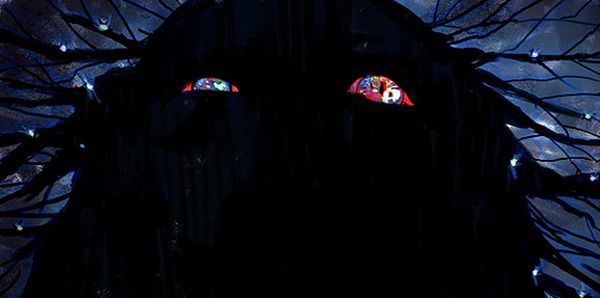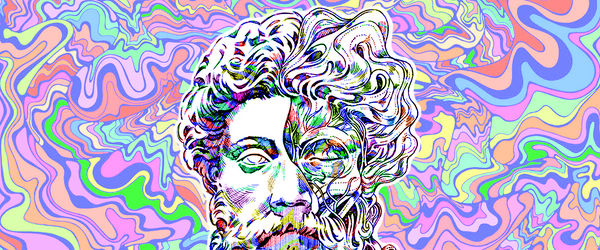Martijn Schirp • • 5 min read
God and His Shadow

For the last few thousand years our existence has been explained by metaphysical constructs, truths that lie hidden behind the appearances, everlasting ideas beyond what our senses can see and hear. The philosopher Plato, with his famous allegory of the cave, stated that appearances are intrinsically false, things aren’t as they appear to be, and the only way to get to truth was to venture deep in the rational realm, far away from anything living and breathing.
This was taken up by Christianity who still holds that the sensuous world is corrupted, a fall away from the true nature of things, namely God, the cause and creator of All. We can only understand our being in the world by thinking about hidden realms that can’t be seen, touched or smelled. According to the priests who mediated between these transcendental explanations and the daily lives of the common people, our bodies were not to be trusted because in them lied the source of our vices. This culminated in Descartes’ ‘Cogito Ergo Sum’, I Think, therefore I Am. The only thing we can Absolutely sure of, is that we are a Transcendental Ego. We are not emotions, bodies or living and dying Beings, but an immortal soul gazing down upon the world.
After the middle ages, the power of the Church steadily declined and more and more philosophers dared to think more freely. God slowly stopped to be the ultimate frame of reference and new and daring philosophies sprung up. At one point, Nietzsche proclaimed in his famous parable of the Madman:
God is dead. God remains dead. And we have killed him. How shall we comfort ourselves, the murderers of all murderers? What was holiest and mightiest of all that the world has yet owned has bled to death under our knives: who will wipe this blood off us? What water is there for us to clean ourselves? What festivals of atonement, what sacred games shall we have to invent? Is not the greatness of this deed too great for us? Must we ourselves not become gods simply to appear worthy of it? There has never been a greater deed; and whosoever shall be born after us – for the sake of this deed he shall be part of a higher history than all history hitherto.—Nietzsche, The Gay Science, Section 125
The ultimate anchor for all our actions ceased to exist, we couldn’t refer back to the high judge and his holy Scriptures. The empty throne was now a void for us to be filled. While all of this is probably not unfamiliar to us now, Nietzsche tried to steer our gaze to the mountainous implications of this moment in history. The quest for objective truth was now unmasked as nothing more than a drive to power which had been in the hands of the priests for far too long. Now it was time to take responsibility for our fate into our own hands, and only for ourselves, Nietzsche argued.One aspect of this responsibility was to overcome the Shadow of God. The above parable continues with:
Here the madman fell silent and again regarded his listeners; and they too were silent and stared at him in astonishment. At last he threw his lantern to the ground, and it broke and went out. “I have come too early,” he said then; “my time has not come yet. The tremendous event is still on its way, still travelling – it has not yet reached the ears of men. Lightning and thunder require time, the light of the stars requires time, deeds require time even after they are done, before they can be seen and heard. This deed is still more distant from them than the distant stars – and yet they have done it themselves.”—Nietzsche, The Gay Science, Section 125
Since every action requires time to bear its fruit, the implications of our deed has remained largely unnoticed. Light hasn’t arrived yet to dispel the immense shadow of our fallen God. We are still living under its weight.
New Struggles. After Buddha was dead people showed his shadow for centuries afterwards in a cave, – an immense frightful shadow. God is dead: – but as the human race is constituted, there will perhaps be caves for millenniums yet, in which people will show his shadow. – And we – we have still to overcome his shadow!
—Nietzsche, The Gay Science, Section 108
What is His shadow? Everything that is an eternal and overarching truth. Every absolute order of the world. Everything that lies beyond our senses as rational postulates. Every idea of an Cause, Effect, Morality, Truth and Purpose. In short, every Meta–Narrative. For instance, Nietzsche was deeply suspicious of science, not that it could be used as a means to an end or that it could say valid things about science itself, but as a tool to get to objective truth about how the world really is in itself, to get to a third-person view, Gods view, unobstructed by fallible humans like ourselves.
We can still see that the light hasn’t reached our eyes yet when we look at how many of us construct our beliefs. We still constantly refer to something outside of what we can immediately grasp, as an unmistakable authority, to proof the validity of our knowledge. We refer to the brain as the source of our Being, where the neurons rule over our experience and the neuro-chemicals determine our Fate. Yet, nobody has ever seen their serotonin cause their love for their significant Other. However, some with a shadow-like coldness claim we are nothing but our brains.
We refer to the big bang as the Source of all there is, the Cause of all the mesons, strings, gluons, quarks and Dimensions. An event so far back that no living ‘Soul’ has any clue what that must have been like and what it could possible mean for us today.
I am not denying the significance of these multifarious truths. I am denying that they are objectively True, and especially, that they are more important than our moment to moment experience, like right now, while you are reading these letters, these words and meaning that just can’t be reduced to flickering photons and electromagnetism. They are not more Real than the smell of the woods, the wetness of the rain, the earth that sustains our intricate world. Do not dwell in fantasies when you are in pain! Bear it, feel the depth! Our senses offer a world to open yourself up to, a sensitivity to be cultivated.
Want to know what life is all about? Live it.
Want to know what Love is? Embrace it.
Want to know Truth is? Embody it.
Our lives are not cold facts to be analyzed with a disinterested look, but are a suffering, imperfect, growing and decaying miracle we care for. Our only true fate is contingency! Suddenly an event creeps into our horizon, ex-nihilo, unbound by any law, some bad news perhaps, or a sudden change of wind and sun, making us shiver like the animals we are. Those who follow some unseen and unproven higher order that governs that which finds itself in front of our gaze and our very beating heart, those who hold on proof, hah!, with their fear, like they hold onto a floating raft in a open sea, they will miss the play of fortuity.
Just beyond experience!— Even great spirits have only their five fingers breadth of experience – just beyond it their thinking ceases and their endless empty space and stupidity begins.
—Nietzsche, Daybreak, Section 564
There are many more implications for the Death of God and it’s worth discovering themselves in your own life. For more information, education, read and watch:
- Nietzsche – The Gay Science
- Nietzsche – Thus Spoke Zarathustra
- David Abram – Becoming Animal
- Watch Being in the World on YouTube.


![Seneca’s Groundless Fears: 11 Stoic Principles for Overcoming Panic [Video]](/content/images/size/w600/wp-content/uploads/2020/04/seneca.png)







